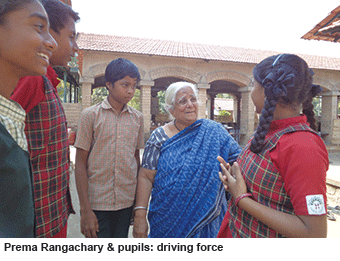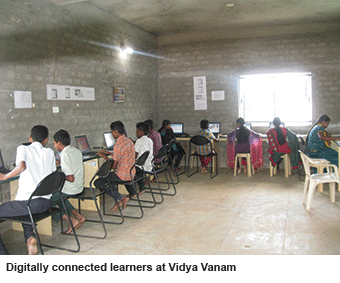Over the past nine years, Vidya Vanam, an alternative school providing education to K-IX students of impoverished backward communities living on the Kerala-Tamil Nadu border, has miraculously transformed the lives and destiny of tribals and their children Hemalatha Raghupathi
.gif) Prior to 2007, the Irula tribe and other impoverished backward communities living in 25 villages surrounding the town of Anaikatti (elephant corridor; pop. 2,438), 32 km from Coimbatore on the Tamil Nadu-Kerala border, were eking out precarious livelihoods working as casual labour in coffee plantations and brick kilns. They could at best dream of giving their children a decent education.
Prior to 2007, the Irula tribe and other impoverished backward communities living in 25 villages surrounding the town of Anaikatti (elephant corridor; pop. 2,438), 32 km from Coimbatore on the Tamil Nadu-Kerala border, were eking out precarious livelihoods working as casual labour in coffee plantations and brick kilns. They could at best dream of giving their children a decent education.
Then the Bhuvana Foundation stepped in nine years ago. A registered education NGO (estb. January 2007), it has miraculously transformed the lives and destiny of the tribals and their children through several education and community development initiatives.
Jointly founded by Anaikatti-based educationist Prema Rangachary, her US-based neurologist brother Dr. S. Sriram and Padma Shree awardee Shanthi Ranganathan, the mission of the Bhuvana Foundation is to provide education, health and self-employment opportunities to economically uplift the tribals and backward classes in remote villages surrounding Anaikatti.
The spearhead project of the Bhuvana Foundation is the Vidya Vanam School (‘education in the forest’) in Anaikatti, started in June 2007 by Prema Rangachary. Currently, the school provides English-medium, alternative education to 300 K-IX students whose parents are illiterate daily wage labourers of the Irula tribe, adi dravidar and OBC (other backward classes) communities.
Vidya Vanam provides free-of-charge education to tribal students, but as a token of the community’s pledge to support the school, non-tribal students pay a fee of Rs.300-500 per month which covers tuition and school bus charges.
The school also dispenses free books, stationery, uniforms and three nutritious meals and snacks to all students everyday at a total cost of Rs.25,000 per student per year, and is entirely supported by voluntary contributions from friends and family of Rangachary and donations from individuals and corporates. Vidya Vanam is accredited by the National Institute of Open Schooling (NIOS) till class VIII, and Rangachary is striving for state government recognition of the class X certification issued by the school. For the higher secondary school which is on the drawing board, Vidya Vanam is affiliated with Edexcel, UK and plans to offer its International General Certificate of Secondary Education (IGCSE) programme.
Promoters & Drivers
The driving force behind the school is 73-year-old Rangachary. An English literature postgrad of Madras University, Rangachary began her career in the Ethiraj College for Women, Chennai in 1965, where she taught for three years before marriage and family commitments compelled her to take a long break. She picked up the threads of her career again in 1985 and promoted Akshara Vidya Peetam, a primary school and Kala Peetam, a school of fine arts, in 1987 in Chennai, which she ran successfully for 15 years before winding up both in 2000 for “compelling personal reasons”.
Rangachary’s introduction to Anaikatti and establishment of Vidya Vanam School was unplanned and fortuitous. “At a friend’s request I first visited Anaikatti in 2003 to help with state government-run balwadis (pre-primaries),” she recalls. Coterminously, her brother Dr. S. Sriram, a practising neurologist in the US, expressed interest in promoting education for underprivileged children in India. The outcome was the Bhuvana Foundation. The Swami Dayananda Saraswathi Ashram in Anaikatti donated one acre of land for the school premises and Vidya Vanam enrolled its first batch of 40 students in July 2007.
Unique pedagogy
At Vidya Vanam, Rangachary has challenged conventional teaching and developed innovative pedagogies that keep rural children connected to their roots and environment. The pedagogy is broadly based on Montessori principles and encourages teacher-pupil communication and questioning. From upper primary onwards, children learn in mixed-age classrooms classified subject-wise, with students moving from one class to another. “Our objective is to create fear-free environments with students given the freedom to explore, analyse and learn independently. Children need to be provided content that engages them and allows them to learn by doing and observing, so they develop thinking, connectivity and analytical skills,” says Rangachary.
 Over the past nine years, the foundation has pulled out all stops to ensure the school offers modern infrastructure facilities to its 300 students. The campus which has grown to 2.6 acres in the verdant hills of the Western Ghats, is wi-fi enabled and offers 24 tiled-roof class rooms, computer and science labs and dedicated practice rooms for art, dance, music, and a library with over 3,000 volumes. A multipurpose grand hall is used for morning assembly, dining, and arts, crafts, music and dance performances.
Over the past nine years, the foundation has pulled out all stops to ensure the school offers modern infrastructure facilities to its 300 students. The campus which has grown to 2.6 acres in the verdant hills of the Western Ghats, is wi-fi enabled and offers 24 tiled-roof class rooms, computer and science labs and dedicated practice rooms for art, dance, music, and a library with over 3,000 volumes. A multipurpose grand hall is used for morning assembly, dining, and arts, crafts, music and dance performances.
Staff quarters can accommodate ten residential teachers. Rangachary lives in her own quarters on the campus. Vidya Vanam also attracts visiting faculty from across the country and abroad, averaging a tenure of ten months.
Community development
Vidya Vanam serves as a knowledge resource base for women of the community. The school supports a community centre project for Irula tribal women which teaches them stitching, embroidery and other crafts. This enables a five-member team of the community centre to make and sell bags, files and folders, cushion covers, stoles, cane baskets and mats. Moreover, since the Irula have access to forest produce, the school has begun to help them make, package and market bottled honey, herbal shampoo and body scrubs.
Future plans
Vidya Vanam’s unique child and environment-centred pedagogy has ensured excellent learning outcomes with tribal children who could only speak a dialect when they entered school, learning to read, write and speak English and Tamil fluently. Rangachary’s son Srikanth, an alumnus of the Academy for Management Excellence (ACME), a division of the Chennai-based Institute for Financial Management and Research (IFMR), recently quit his five-year teaching job at the HLC International School, Chennai, and joined his mother at Vidya Vanam..gif)
Although the Bhuvana Foundation trustees are reticent about disclosing details such as endowment corpus, they are confident that the trust has a committed community of donors sufficiently impressed with the learning outcomes and development of Vidya Vanam students, to meet the annual expenditure of Rs.75 lakh. Moreover, it’s well-known that the trust and the school have the support of the Chennai-based TTK Group of companies (annual revenue: Rs.3,000 crore) — a big name in modern cookware and consumer products in South India — with whom the trustees are related by ties of blood and kinship. “We have applied for an annual grant-in aid from the government of India for the uplift of tribal children and are hopeful of receiving Rs.200,000 per annum in the near future, ” says Srikanth.
Meanwhile, the Vidya Vanam management has begun training the first batch to write the class X board examinations next year. “Further on, while we are ready to facilitate those who want to pursue college education, most students prefer to earn their livelihood in the villages. Hence we are planning to start vocational courses in agriculture, animal husbandry, graphic design, plumbing and electricals so that students can be trained and absorbed in local industries or become self-employed. The Bhuvana Foundation will continue its efforts to support the local community through new education and employment initiatives as and when the need arises,” says Rangachary.
Wind beneath your wings!